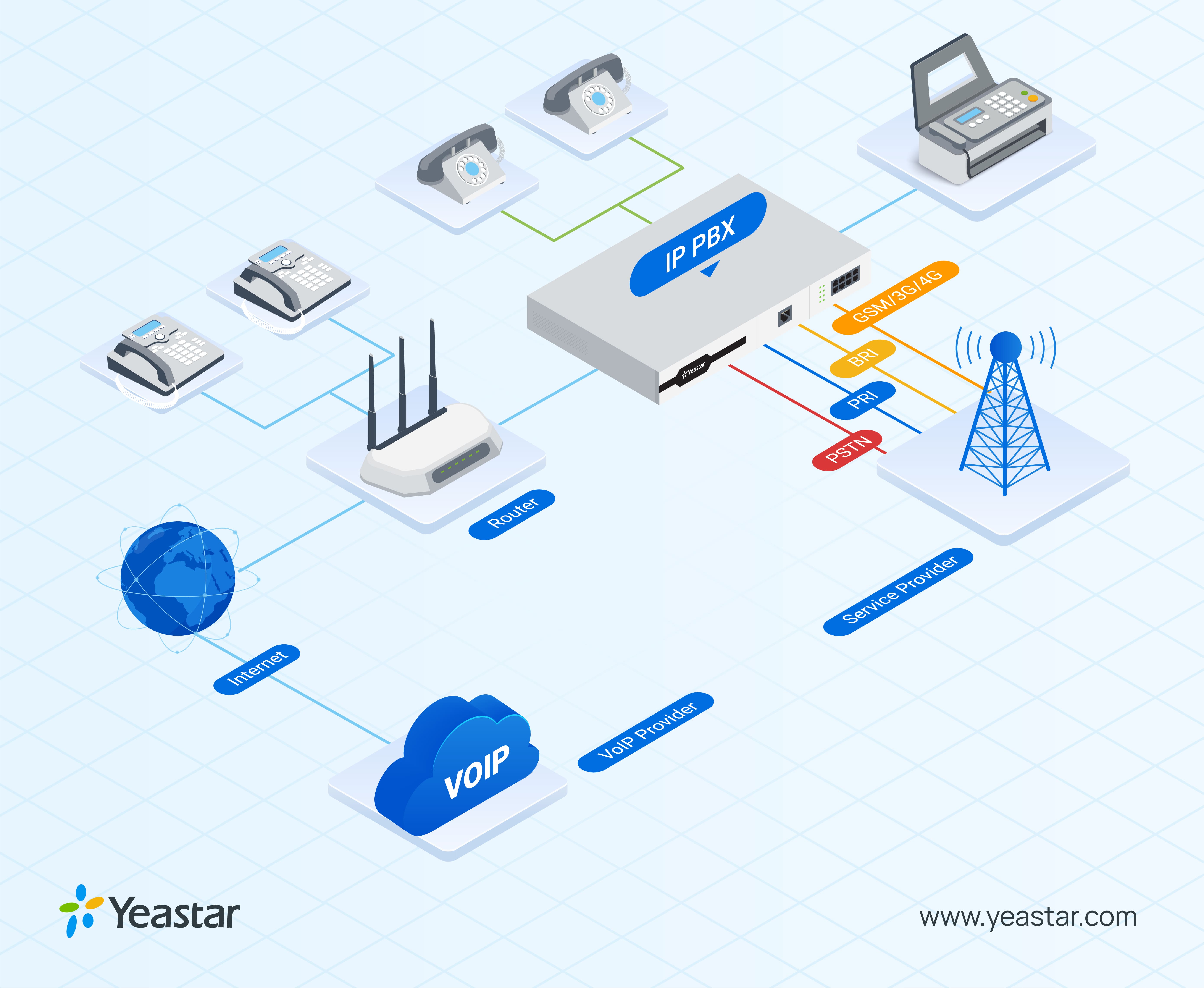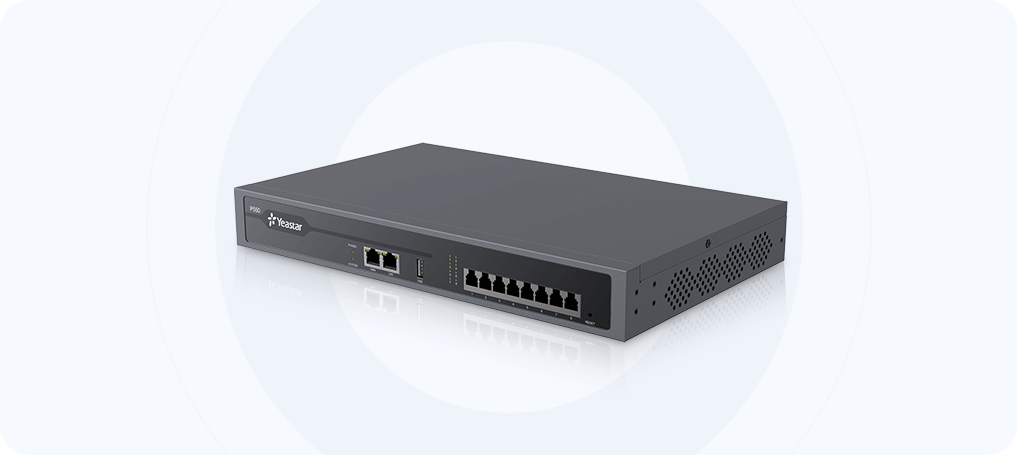
When upgrading business communications, several key points must be considered. It is advisable to begin by deciding whether to opt for a hosted or on-premise solution. This choice hinges on several factors, including the size of the company, existing infrastructure, budget constraints, management resources, and the desired outcomes from the PBX (Private Branch Exchange) upgrade.
To help you make an informed decision, we will look at 5 key questions that you should ask when choosing between an on-premises and cloud PBX system.
Before we get started, let’s have a quick look at the differences between the two and the benefits that each option could provide.
- Pros and Cons of On-premise PBX →
- Pros and Cons of Cloud PBX →
- Pros and Cons of Hosted PBX →
- How To Choose Between On-premises PBX or Cloud/Hosted PBX? →

On-premises PBX

An On-Premise PBX is a business phone system where the hardware is installed and maintained at the customer’s location or local data center. You purchase and own the phone system hardware, networking, server equipment, and more, and your IT staff take care of all the updates and maintenance regarding the system. The calls are routed through traditional phone lines (ISDN, PSTN, GSM) as well as SIP trunking.
Benefits of On-premises PBX
There are several compelling reasons to adopt an on-premise PBX solution. If you’re weighing the benefits of a PBX that is kept and maintained on your premise instead of hosted by your providers, here are the arguments in favor of that.
- Premise PBX has a lower cost in the long run.
- Potential to reduce costs via SIP trunking.
- Owning your own network and server systems and keeping them on-premise gives you more control.
- IP PBX ensures that phone calls will be available even if the internet is down.
- More ability to determine the level of security that will meet your needs.
- Your IT security team might prefer an on-premise PBX so they can apply their own solutions.
Cons of On-premise PBX
- Require a higher upfront investment in hardware and software
- Require specialized IT expertise for system maintenance
- Limited scalability. Businesses may need to purchase additional hardware and software to accommodate growth
Cloud PBX
A cloud-based PBX system is delivered entirely over the Internet and managed completely off-site by a service provider. The only equipment you need to purchase is desk phones. You have some control over the system while the hosted service provider supplies voice services and performs all updates and maintenance. Most hosted voice solutions are charged on a subscription basis with minute packages or by minutes.

Benefits of Cloud PBX
Should your company opt for cloud communications? There are certainly many attractive features here. Take a closer look at some of the benefits you might enjoy:
- A cloud-based phone system takes very little time to set up.
- You can add new lines and make them available almost immediately.
- Some of the best device flexibility with users able to connect via desktops, smartphones, or VoIP phones.
- Fewer hardware resources to manage onsite.
- Exceptionally lower cost.
- Feature-rich solution.
- One of the most scalable solutions.
Cons of Cloud PBX
- Cloud PBX systems may have lower security compared to on-premise PBX systems, as the data is hosted by a third-party provider. This can be a concern for businesses that require high levels of security and control
Hosted PBX
Hosted PBX systems allow you to retain control of your phone system whilst remotely hosting the software from either the vendor or a third-party hosting provider. In this case, the systems are maintained on physical servers that are held at an external location. Support, management, and infrastructure maintenance of these systems are the responsibility of the service provider. This solution may be referred to as virtual PBX. Companies who choose this option reduce maintenance costs and can rely on their provider to take on the majority of upkeep. With a hosted PBX phone system, companies are still able to use the advantages of VoIP features, such as IVR, conference calling, and voicemail.
Benefits of Hosted PBX
The following may be the reasons why businesses adopt hosted PBX solutions.
- Flexibility to choose a hosting provider and SIP trunk provider for a tailored solution that fits your needs and budget.
- It’s a scalable solution that allows for easy growth after setup.
- It’s easy to use as the provider handles all maintenance and support.
- There’s an upfront cost saving as the setup is managed externally.
- Enjoy ongoing savings as your company doesn’t have to hire in-house staff for server or network management.
- Even small organizations can use advanced telephony features like their largest competitors.
- No maintaining security for extra equipment stored on-premise.
Cons of Hosted PBX
- Cloud PBX systems may have lower security compared to on-premise PBX systems, as the data is hosted by a third-party provider. This can be a concern for businesses that require high levels of security and control
How To Choose Between On-premises PBX or Cloud/Hosted PBX?
To decide between maintaining your telephone communications on-site, or relying on a hosting provider, you need to assess your business needs and make some predictions about your growth.
- What is your current staffing?
- Does your IT department have the skill set to manage an in-house communications system?
- Would you be better off outsourcing support and maintenance?
- What about integration with existing systems or unified communications?
A current state analysis will help you determine if an on-premise PBX is best for your organization, or if a hosted solution is the way to go. Here are some factors you should consider to help figure out which type of PBX would better suit your business.
1. What’s your budget and preferred pricing model?
One of the big differences between on-premises and cloud PBX is the upfront cost.
Cloud telephony usually falls under an OpEx model with more affordable monthly or annual fees, low initial equipment costs, and setup costs, which means less money to get started. There is no maintenance fee involved. Telecomm providers tend to offer several subscription plans with different licenses, features, and minute packages.
As for the on-premises option, you need to pay fully upfront for the hardware and interface cards (if needed) to ensure complete ownership of the system. However, it also saves you from the risk of fee increases and means lower monthly costs after expenses are covered.
It’s often preferable for large enterprises to buy their equipment upfront, whereas it’s favored by smaller businesses to pay on a subscription basis. Either way, it’s advisable to have a full evaluation of the total costs of a phone system ownership before your final decision.
2. Do you prefer full control of your business phone system?
When you house the PBX system on-site, you will have full control over business communications. It may be a better fit for companies with complex and dynamic communication needs since they can modify it as needed. Also, if the Internet service goes down, they can still rely on traditional phone lines to ensure minimal service disruption.
If you opt for a cloud-based solution, the responsibility of running the PBX is down to the third-party, which can be a huge advantage to small businesses with fewer resources. The potential risk is that the service provider may fail to deliver on its promised quality of service.
In short, it’s a choice between control and responsibility. More control over the system equals more responsibility for maintaining and managing it.
3. Do you foresee significant changes in the staffing level?
In terms of system expansion, cloud-based phone systems are typically more scalable than on-premises ones. Cloud PBX provides a more flexible solution for businesses with staff growth or reduction during the lifetime of the system. The increase and decrease of phone extensions can be made immediately and businesses only pay for what they need.
If you are a seasonal business with fluctuating communications needs or experiencing rapid growth, a hosted model might work better for you. If your business is fairly stable and does not have significant changes in the number of employees in the foreseeable future, it’s totally okay to opt for the on-premises deployment.
4. Do you have multiple offices or remote workers?
Cloud PBX system is capable of unifying the headquarter with remote offices and a handful of teleworkers by consolidating every employee’s phone extension under one system.
As for on-premises PBX, it certainly can handle remote users and multiple offices, but compared to the cloud-based solution, it may be a little more complex and expensive.
As unified communications become the new norm, now many premise and cloud solutions can both provide mobile and desktop softphones as well as a comprehensive UC features set including VoIP, conferencing, collaboration, unified messaging, and more. Remember to consider if your business operates across multiple locations and has remote workers as it will bring great convenience and efficiency improvements
5. Are your IT staff capable of maintaining the system?
With the on-premises deployment, the responsibility of installation, upgrades, and maintenance all falls on the shoulders of your IT staff. So before purchasing a premise PBX, businesses should evaluate their IT strength. Do you have technicians with the required expertise to handle all those work? Besides, some businesses may have IT resources that are fully capable of managing their enterprise phone system but would rather prioritize more important and revenue-generating projects.
A cloud-based hosted phone system is up to the service provider to manage the system, which would be beneficial for small businesses and start-ups lacking in technical expertise or resources. There’s also no need to worry about any network issues.
Final Thoughts
Both on-premises and cloud PBX are effective and reliable company phone systems that offer different benefits, whereas each system may be a better option for specific communications requirements. When it comes to the choice between them, there are many things to factor in, such as the size of your business, the number of remote offices, the level of your technical expertise, your tolerance for being dependent on service providers, and more.
Make a thorough evaluation before purchasing. We have worked out a Small Business Phone System Buyer’s Guide to help you find the right VoIP enterprise phone system that will save you money, time, and effort.


